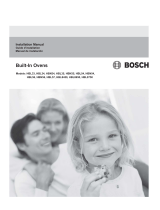
9 IMPORTANT SAFETY INSTRUCTIONS
READ AND SAVE THESE INSTRUCTIONS
9001065629 Rev A English 1
Safety Definitions
NOTICE: This indicates that damage to the appliance or
property may occur as a result of non-compliance with this
advisory.
Note: This alerts you to important information and/or tips.
Safety Information
IMPORTANT: SAVE THESE INSTRUCTIONS FOR THE
LOCAL INSPECTOR'S USE.
INSTALLER: LEAVE THESE INSTRUCTIONS WITH THE
APPLIANCE AFTER INSTALLATION IS COMPLETE.
OWNER: PLEASE RETAIN THESE INSTRUCTIONS FOR
FUTURE REFERENCE.
Appliance Handling Safety
Do not lift appliance by door handle. Remove the door for
easier handling and installation. See instructions in Use
and Care Manual.
Unit is heavy and it is recommended that at least two
people for single ovens and at least three people for double
ovens be used.
Hidden surfaces may have sharp edges. Use caution when
reaching behind or under appliance.
Unpacking the Oven
Unpack the oven, remove all tape and packaging material
and examine the oven for any damage such as dents,
broken door latches or cracks in the door. Notify dealer
immediately if oven is damaged. Do not install if oven is
damaged.
Safety Codes and Standards
This appliance complies with one or more of the following
Standards:
• UL 858, Household Electric Ranges
• UL 923, Microwave Cooking Appliances
• UL 507, The Standard for the Safety of Electric Fans
• CAN/CSA-C22.2 No. 113-M1984 Fans and Ventilators
It is the responsibility of the owner and the installer to
determine if additional requirements and/or standards
apply to specific installations.
Electric Safety
Before you plug in an electrical cord, be sure all controls
are in the OFF position.
If required by the National Electrical Code (or Canadian
Electrical Code), this appliance must be installed on a
separate branch circuit.
Installer - show the owner the location of the circuit
breaker or fuse. Mark it for easy reference.
Important - Save these instructions for the local electrical
inspector's use.
Before installing, turn power OFF at the service panel. Lock
service panel to prevent power from being turned ON
accidentally.
9 WARNING
This indicates that death or serious injuries may
occur as a result of non-observance of this warning.
9 CAUTION
This indicates that minor or moderate injuries may
occur as a result of non-observance of this warning.
9 WARNING
If the information in this manual is not followed
exactly, fire or shock may result causing property
damage or personal injury.
9 WARNING
Do not repair or replace any part of the appliance
unless specifically recommended in the manuals.
Improper installation, service or maintenance can
cause injury or property damage. Refer to this
manual for guidance. All servicing should be done
by a qualified technician.





















